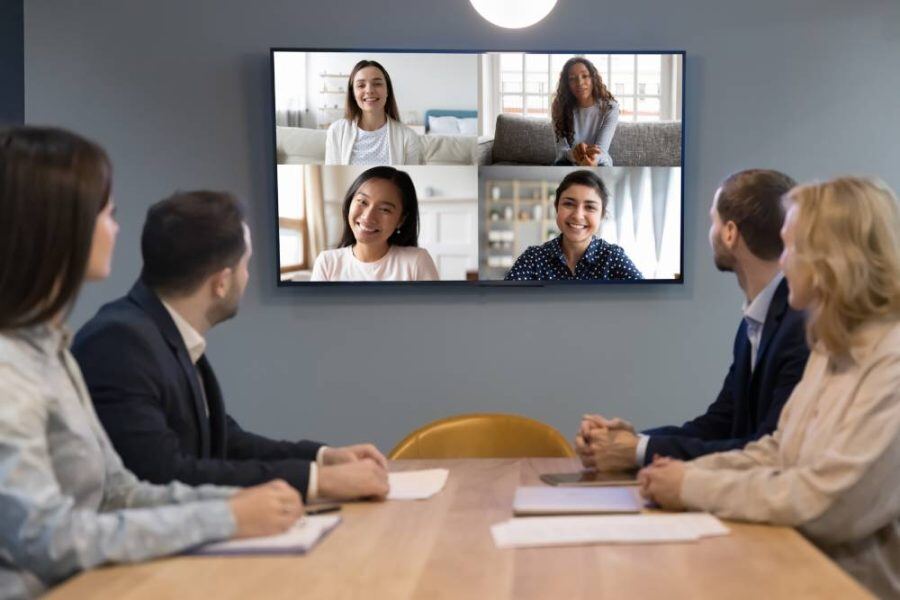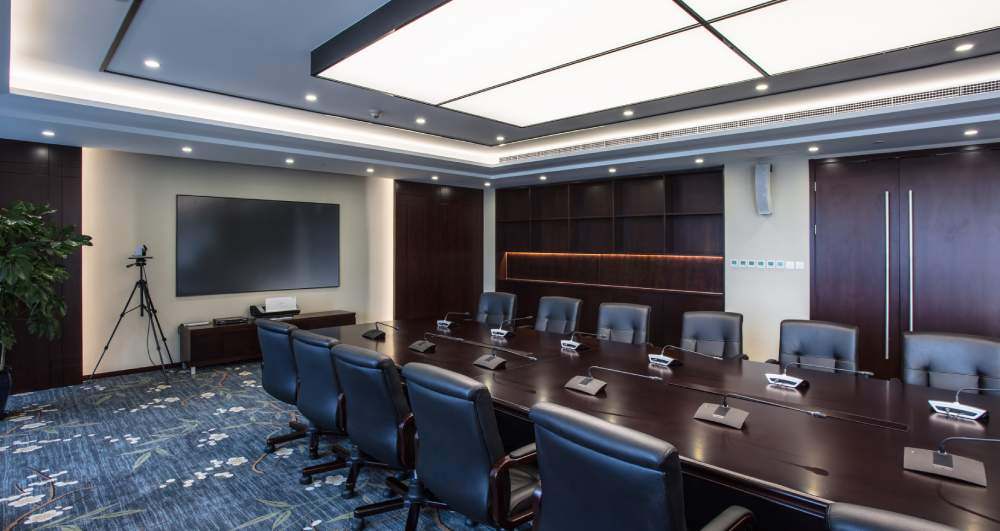How to Create Human-Centric Experiences in Hybrid Meeting Spaces
The way we work and collaborate has undergone a profound transformation in recent years, with the rise of remote work and hybrid work models. As...
3 min read
Frederic Nestler
:
10/16/23 12:00 AM

Whether it’s a TV or a projector, both are commonly found in conference rooms and are essential equipment for presentations. When planning a new conference room, the choice between these two devices depends on factors such as room size, usage, and budget. Below, we’ll provide more detailed explanations to help you determine the most suitable option.
For a conference room that can accommodate up to 30 people, the projection should ensure that everyone in the room can see clearly, requiring a sufficiently large image. To provide a large screen experience, a projector is the optimal choice. Common TVs on the market are around 65 inches in size, while larger options like 85 inches or 98 inches are available. If you’re aiming for even larger screens like 100 inches or 120 inches, a projector is the way to go.
Both TVs and projectors offer good image resolutions. TVs typically come with 4K resolution as standard, whereas projectors might not have the same level of resolution, especially beyond 1080p. Projectors with higher resolutions require darker environments to achieve optimal results.
Your budget will influence your choice of specifications. If you’re looking for a larger-than-life experience, such as 100 inches or 120 inches, a projector could be a cost-effective option. However, if you don’t require such a large screen size, a TV might be the better choice. The decision here depends on the specifications you’re aiming for.
The first factor to consider is the projector’s resolution. The resolution of a projector refers to the number of pixels it can display. The higher the resolution, the clearer and sharper the image will be. When choosing a projector, it is essential to consider the resolution of the content you will be displaying. If you are using the projector for presentations, a resolution of 1024×768 should suffice. However, if you plan to use it for movies or gaming, we recommend a resolution of 1080p or higher for a better viewing experience.
The brightness of a projector is measured in lumens, and it determines how well the image will be visible in different lighting conditions. The brightness required for your projector will depend on the environment in which it will be used. For a dimly lit room, a projector with a brightness of 1500 lumens should be adequate. However, if the projector will be used in a brightly lit room or outdoors, we recommend a brightness of at least 3000 lumens.
The contrast ratio of a projector is the difference between the brightest and darkest parts of an image. The higher the contrast ratio, the more vibrant and vivid the image will appear. A contrast ratio of 2000:1 or higher is recommended for a better viewing experience.
The lamp life of a projector determines how long the lamp will last before it needs to be replaced. The lamp life is typically measured in hours, and it can range from 2000 hours to 5000 hours or more. It is essential to consider the lamp life when choosing a projector, as the replacement lamp can be expensive.
The connectivity options of a projector are essential to consider, as they determine what devices you can connect to the projector. Most projectors come with an HDMI port, which can be used to connect to laptops, gaming consoles, and other devices. Some projectors also have VGA, USB, and Ethernet ports, which can be used to connect to other devices.
Choose a TV size based on the room dimensions, ensuring everyone can see the screen comfortably.
In the past, Full HD TVs were the standard, but 4K TVs are becoming more common in the market. 4K TVs provide superior detail and clarity compared to standard Full HD, making them a highly recommended choice. As for 8K TVs, 8K images or videos are currently rare. Until 8K content becomes more widespread, there’s no urgent need to invest in 8K TVs.
We are witnessing a growing availability of Smart TVs, which come equipped with numerous applications and online capabilities. This enriched functionality offers diverse content options, featuring popular platforms like YouTube, Netflix, Apple TV, and more.
When setting up a TV or projector in a conference room, people often place them on tables or mount them higher up. Regardless of the setup, ensure easy access to HDMI cables. However, wireless presentation systems offer the advantage of wire-free connections to TVs and projectors, supporting laptops, phones, and tablets for presentations. Let’s take ASTROS Screensharing as example and talk about its key benefits:
ASTROS supports easy screen sharing from laptops, phones, and tablets using AirPlay or Google Cast for mobile devices and an external dongle called ASTROS Pod for laptops.
ASTROS employs encryption mechanisms and password protection to prevent unauthorized access during the screen sharing process.
ASTROS offers simple usability and IT managers don’t need to spend much time on training people how to use the system. ASTROS Manager also allows IT to manage all deployed wireless presentation devices efficiently.
ASTROS’ collaborative features are adaptable to various business scenarios, including cross-country product training sessions and internal workshops. You can check out our to learn more.
If you want to learn more about ASTROS wireless presentation, don’t hesitate to contact our experts who will provide you with comprehensive information:

The way we work and collaborate has undergone a profound transformation in recent years, with the rise of remote work and hybrid work models. As...

At Astrogate, we understand the importance of selecting the right conference room technology to ensure productive and efficient meetings. With so...

As the world moves towards hybrid work models, companies are increasingly prioritizing which video conferencing solutions to use to ensure...